Tourism Operations Management Report
VerifiedAdded on 2020/09/08
|12
|3922
|500
AI Summary
The assignment provided is a report on tourism operations management. It covers various aspects of the industry, including recent developments, timescales and stages for developing holiday packages, and effective contribution towards increasing the economy of the United Kingdom. The report also discusses non-traditional distribution methods used by tour operators to sell holiday packages. References from books and journals are provided to support the content of the report.
Contribute Materials
Your contribution can guide someone’s learning journey. Share your
documents today.
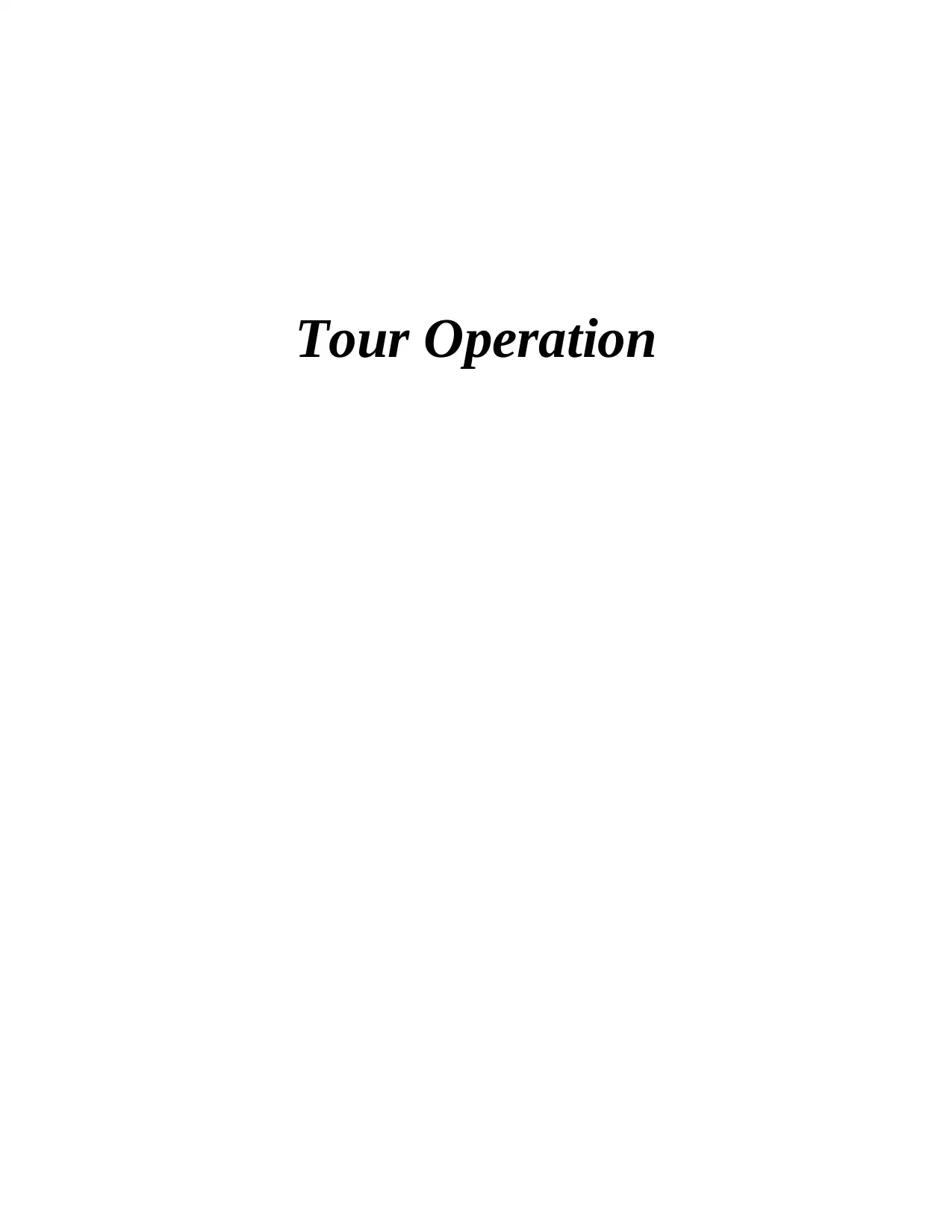
Tour Operation
Secure Best Marks with AI Grader
Need help grading? Try our AI Grader for instant feedback on your assignments.
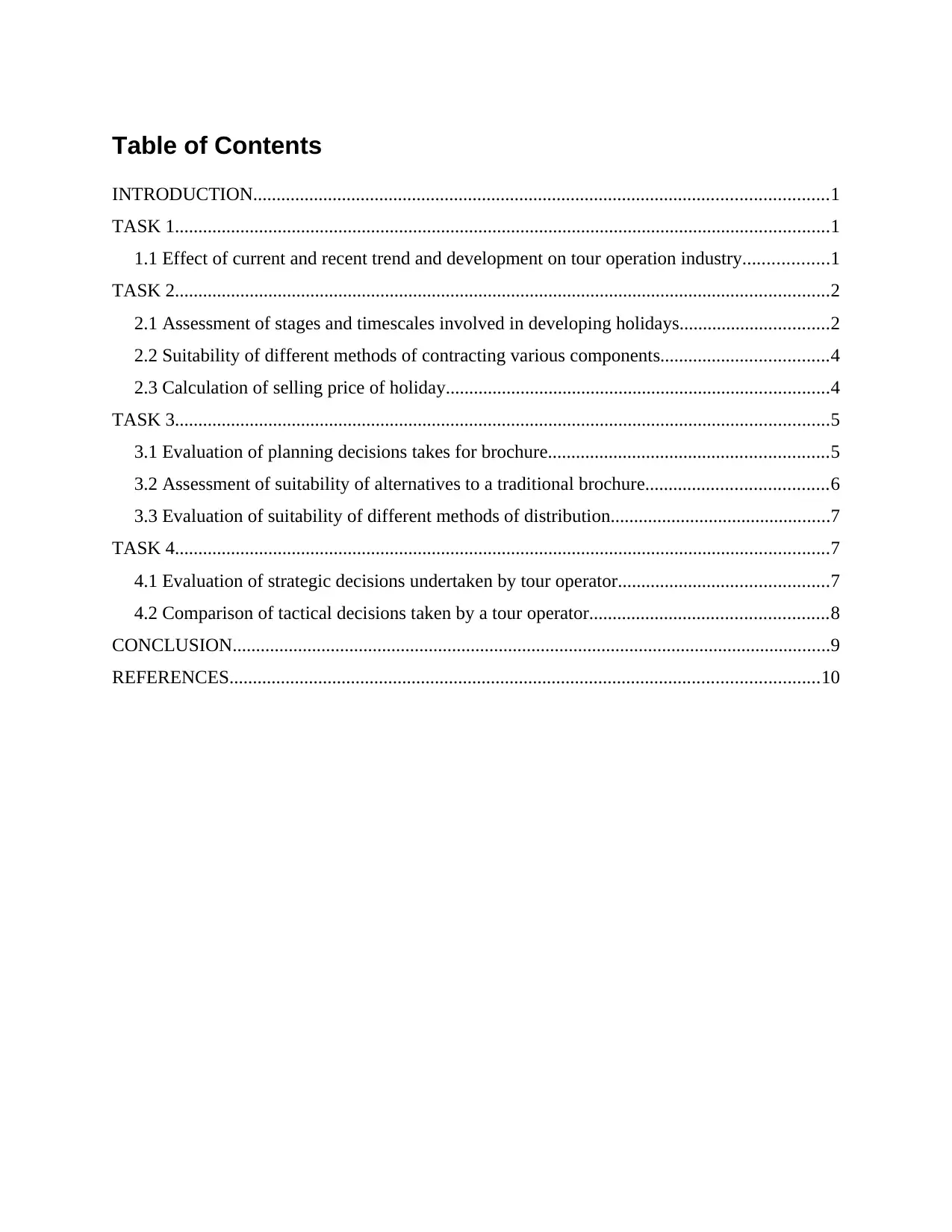
Table of Contents
INTRODUCTION...........................................................................................................................1
TASK 1............................................................................................................................................1
1.1 Effect of current and recent trend and development on tour operation industry..................1
TASK 2............................................................................................................................................2
2.1 Assessment of stages and timescales involved in developing holidays................................2
2.2 Suitability of different methods of contracting various components....................................4
2.3 Calculation of selling price of holiday..................................................................................4
TASK 3............................................................................................................................................5
3.1 Evaluation of planning decisions takes for brochure............................................................5
3.2 Assessment of suitability of alternatives to a traditional brochure.......................................6
3.3 Evaluation of suitability of different methods of distribution...............................................7
TASK 4............................................................................................................................................7
4.1 Evaluation of strategic decisions undertaken by tour operator.............................................7
4.2 Comparison of tactical decisions taken by a tour operator...................................................8
CONCLUSION................................................................................................................................9
REFERENCES..............................................................................................................................10
INTRODUCTION...........................................................................................................................1
TASK 1............................................................................................................................................1
1.1 Effect of current and recent trend and development on tour operation industry..................1
TASK 2............................................................................................................................................2
2.1 Assessment of stages and timescales involved in developing holidays................................2
2.2 Suitability of different methods of contracting various components....................................4
2.3 Calculation of selling price of holiday..................................................................................4
TASK 3............................................................................................................................................5
3.1 Evaluation of planning decisions takes for brochure............................................................5
3.2 Assessment of suitability of alternatives to a traditional brochure.......................................6
3.3 Evaluation of suitability of different methods of distribution...............................................7
TASK 4............................................................................................................................................7
4.1 Evaluation of strategic decisions undertaken by tour operator.............................................7
4.2 Comparison of tactical decisions taken by a tour operator...................................................8
CONCLUSION................................................................................................................................9
REFERENCES..............................................................................................................................10
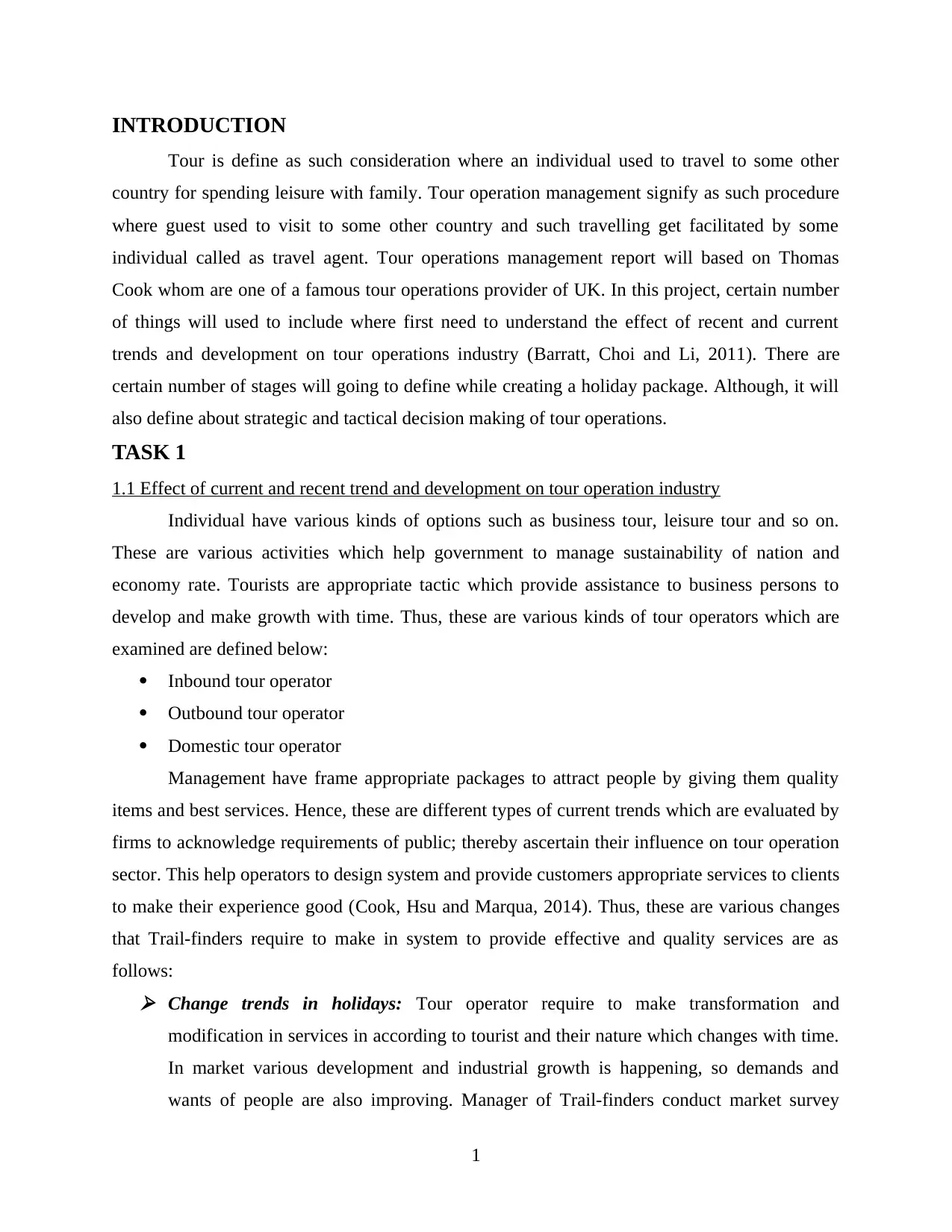
INTRODUCTION
Tour is define as such consideration where an individual used to travel to some other
country for spending leisure with family. Tour operation management signify as such procedure
where guest used to visit to some other country and such travelling get facilitated by some
individual called as travel agent. Tour operations management report will based on Thomas
Cook whom are one of a famous tour operations provider of UK. In this project, certain number
of things will used to include where first need to understand the effect of recent and current
trends and development on tour operations industry (Barratt, Choi and Li, 2011). There are
certain number of stages will going to define while creating a holiday package. Although, it will
also define about strategic and tactical decision making of tour operations.
TASK 1
1.1 Effect of current and recent trend and development on tour operation industry
Individual have various kinds of options such as business tour, leisure tour and so on.
These are various activities which help government to manage sustainability of nation and
economy rate. Tourists are appropriate tactic which provide assistance to business persons to
develop and make growth with time. Thus, these are various kinds of tour operators which are
examined are defined below:
Inbound tour operator
Outbound tour operator
Domestic tour operator
Management have frame appropriate packages to attract people by giving them quality
items and best services. Hence, these are different types of current trends which are evaluated by
firms to acknowledge requirements of public; thereby ascertain their influence on tour operation
sector. This help operators to design system and provide customers appropriate services to clients
to make their experience good (Cook, Hsu and Marqua, 2014). Thus, these are various changes
that Trail-finders require to make in system to provide effective and quality services are as
follows: Change trends in holidays: Tour operator require to make transformation and
modification in services in according to tourist and their nature which changes with time.
In market various development and industrial growth is happening, so demands and
wants of people are also improving. Manager of Trail-finders conduct market survey
1
Tour is define as such consideration where an individual used to travel to some other
country for spending leisure with family. Tour operation management signify as such procedure
where guest used to visit to some other country and such travelling get facilitated by some
individual called as travel agent. Tour operations management report will based on Thomas
Cook whom are one of a famous tour operations provider of UK. In this project, certain number
of things will used to include where first need to understand the effect of recent and current
trends and development on tour operations industry (Barratt, Choi and Li, 2011). There are
certain number of stages will going to define while creating a holiday package. Although, it will
also define about strategic and tactical decision making of tour operations.
TASK 1
1.1 Effect of current and recent trend and development on tour operation industry
Individual have various kinds of options such as business tour, leisure tour and so on.
These are various activities which help government to manage sustainability of nation and
economy rate. Tourists are appropriate tactic which provide assistance to business persons to
develop and make growth with time. Thus, these are various kinds of tour operators which are
examined are defined below:
Inbound tour operator
Outbound tour operator
Domestic tour operator
Management have frame appropriate packages to attract people by giving them quality
items and best services. Hence, these are different types of current trends which are evaluated by
firms to acknowledge requirements of public; thereby ascertain their influence on tour operation
sector. This help operators to design system and provide customers appropriate services to clients
to make their experience good (Cook, Hsu and Marqua, 2014). Thus, these are various changes
that Trail-finders require to make in system to provide effective and quality services are as
follows: Change trends in holidays: Tour operator require to make transformation and
modification in services in according to tourist and their nature which changes with time.
In market various development and industrial growth is happening, so demands and
wants of people are also improving. Manager of Trail-finders conduct market survey
1
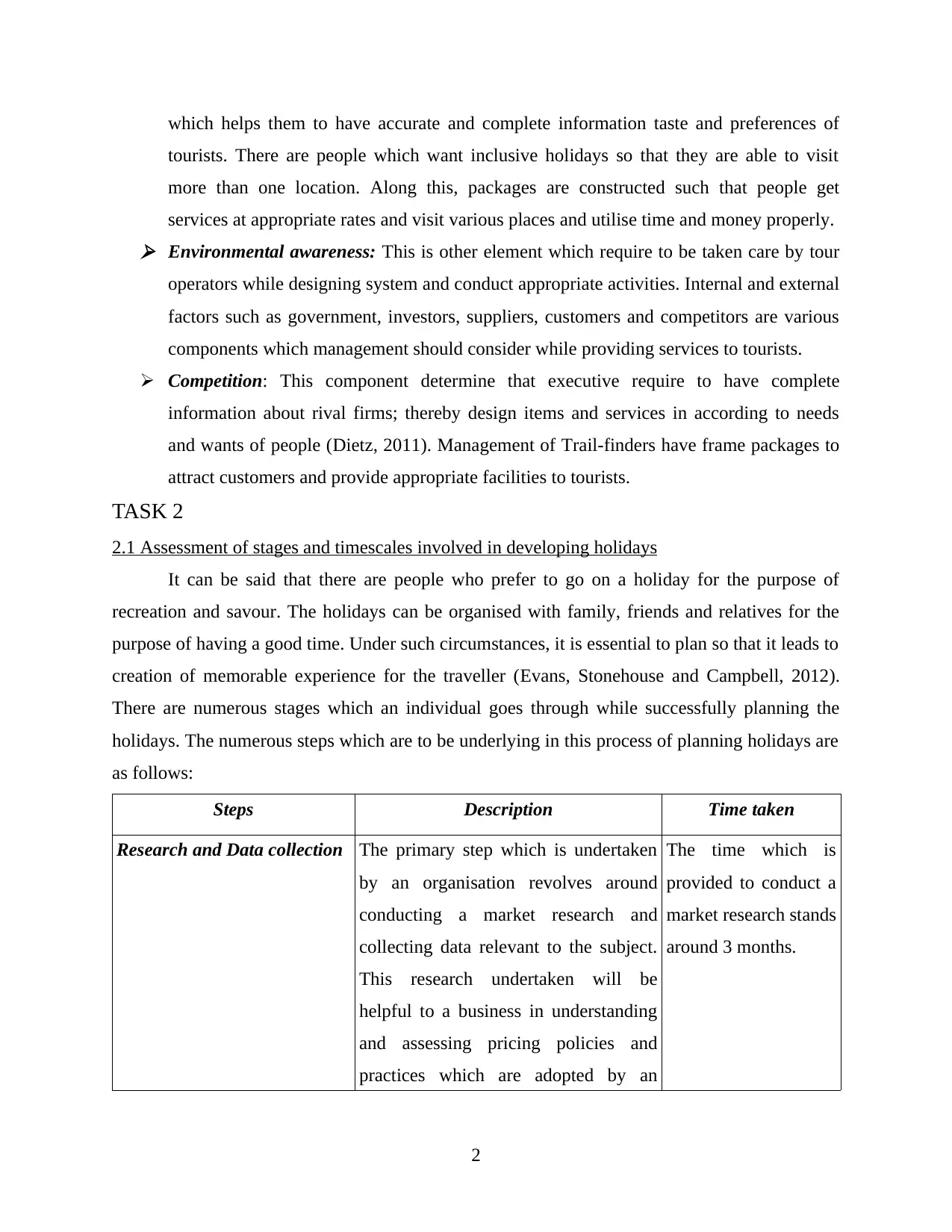
which helps them to have accurate and complete information taste and preferences of
tourists. There are people which want inclusive holidays so that they are able to visit
more than one location. Along this, packages are constructed such that people get
services at appropriate rates and visit various places and utilise time and money properly. Environmental awareness: This is other element which require to be taken care by tour
operators while designing system and conduct appropriate activities. Internal and external
factors such as government, investors, suppliers, customers and competitors are various
components which management should consider while providing services to tourists.
Competition: This component determine that executive require to have complete
information about rival firms; thereby design items and services in according to needs
and wants of people (Dietz, 2011). Management of Trail-finders have frame packages to
attract customers and provide appropriate facilities to tourists.
TASK 2
2.1 Assessment of stages and timescales involved in developing holidays
It can be said that there are people who prefer to go on a holiday for the purpose of
recreation and savour. The holidays can be organised with family, friends and relatives for the
purpose of having a good time. Under such circumstances, it is essential to plan so that it leads to
creation of memorable experience for the traveller (Evans, Stonehouse and Campbell, 2012).
There are numerous stages which an individual goes through while successfully planning the
holidays. The numerous steps which are to be underlying in this process of planning holidays are
as follows:
Steps Description Time taken
Research and Data collection The primary step which is undertaken
by an organisation revolves around
conducting a market research and
collecting data relevant to the subject.
This research undertaken will be
helpful to a business in understanding
and assessing pricing policies and
practices which are adopted by an
The time which is
provided to conduct a
market research stands
around 3 months.
2
tourists. There are people which want inclusive holidays so that they are able to visit
more than one location. Along this, packages are constructed such that people get
services at appropriate rates and visit various places and utilise time and money properly. Environmental awareness: This is other element which require to be taken care by tour
operators while designing system and conduct appropriate activities. Internal and external
factors such as government, investors, suppliers, customers and competitors are various
components which management should consider while providing services to tourists.
Competition: This component determine that executive require to have complete
information about rival firms; thereby design items and services in according to needs
and wants of people (Dietz, 2011). Management of Trail-finders have frame packages to
attract customers and provide appropriate facilities to tourists.
TASK 2
2.1 Assessment of stages and timescales involved in developing holidays
It can be said that there are people who prefer to go on a holiday for the purpose of
recreation and savour. The holidays can be organised with family, friends and relatives for the
purpose of having a good time. Under such circumstances, it is essential to plan so that it leads to
creation of memorable experience for the traveller (Evans, Stonehouse and Campbell, 2012).
There are numerous stages which an individual goes through while successfully planning the
holidays. The numerous steps which are to be underlying in this process of planning holidays are
as follows:
Steps Description Time taken
Research and Data collection The primary step which is undertaken
by an organisation revolves around
conducting a market research and
collecting data relevant to the subject.
This research undertaken will be
helpful to a business in understanding
and assessing pricing policies and
practices which are adopted by an
The time which is
provided to conduct a
market research stands
around 3 months.
2
Secure Best Marks with AI Grader
Need help grading? Try our AI Grader for instant feedback on your assignments.
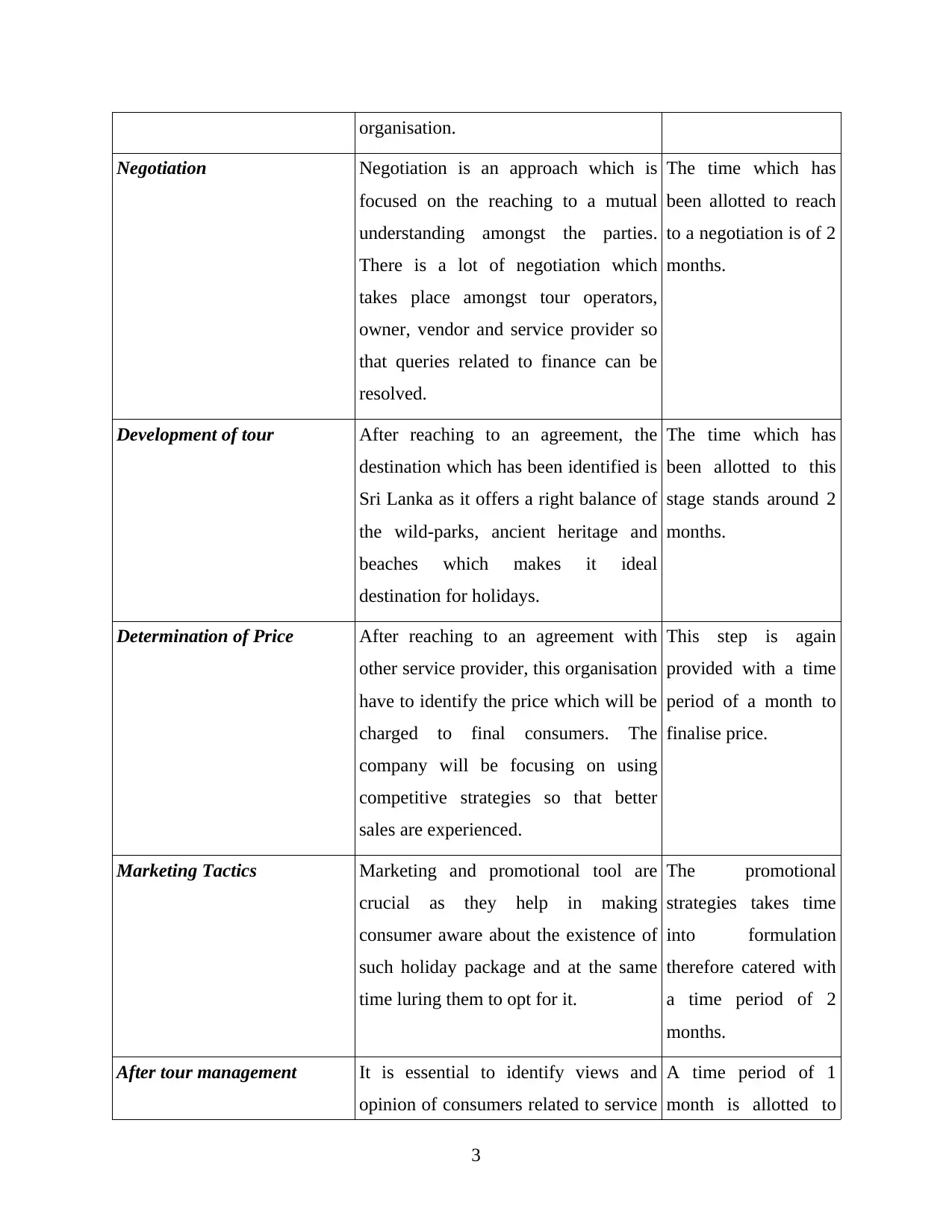
organisation.
Negotiation Negotiation is an approach which is
focused on the reaching to a mutual
understanding amongst the parties.
There is a lot of negotiation which
takes place amongst tour operators,
owner, vendor and service provider so
that queries related to finance can be
resolved.
The time which has
been allotted to reach
to a negotiation is of 2
months.
Development of tour After reaching to an agreement, the
destination which has been identified is
Sri Lanka as it offers a right balance of
the wild-parks, ancient heritage and
beaches which makes it ideal
destination for holidays.
The time which has
been allotted to this
stage stands around 2
months.
Determination of Price After reaching to an agreement with
other service provider, this organisation
have to identify the price which will be
charged to final consumers. The
company will be focusing on using
competitive strategies so that better
sales are experienced.
This step is again
provided with a time
period of a month to
finalise price.
Marketing Tactics Marketing and promotional tool are
crucial as they help in making
consumer aware about the existence of
such holiday package and at the same
time luring them to opt for it.
The promotional
strategies takes time
into formulation
therefore catered with
a time period of 2
months.
After tour management It is essential to identify views and
opinion of consumers related to service
A time period of 1
month is allotted to
3
Negotiation Negotiation is an approach which is
focused on the reaching to a mutual
understanding amongst the parties.
There is a lot of negotiation which
takes place amongst tour operators,
owner, vendor and service provider so
that queries related to finance can be
resolved.
The time which has
been allotted to reach
to a negotiation is of 2
months.
Development of tour After reaching to an agreement, the
destination which has been identified is
Sri Lanka as it offers a right balance of
the wild-parks, ancient heritage and
beaches which makes it ideal
destination for holidays.
The time which has
been allotted to this
stage stands around 2
months.
Determination of Price After reaching to an agreement with
other service provider, this organisation
have to identify the price which will be
charged to final consumers. The
company will be focusing on using
competitive strategies so that better
sales are experienced.
This step is again
provided with a time
period of a month to
finalise price.
Marketing Tactics Marketing and promotional tool are
crucial as they help in making
consumer aware about the existence of
such holiday package and at the same
time luring them to opt for it.
The promotional
strategies takes time
into formulation
therefore catered with
a time period of 2
months.
After tour management It is essential to identify views and
opinion of consumers related to service
A time period of 1
month is allotted to
3
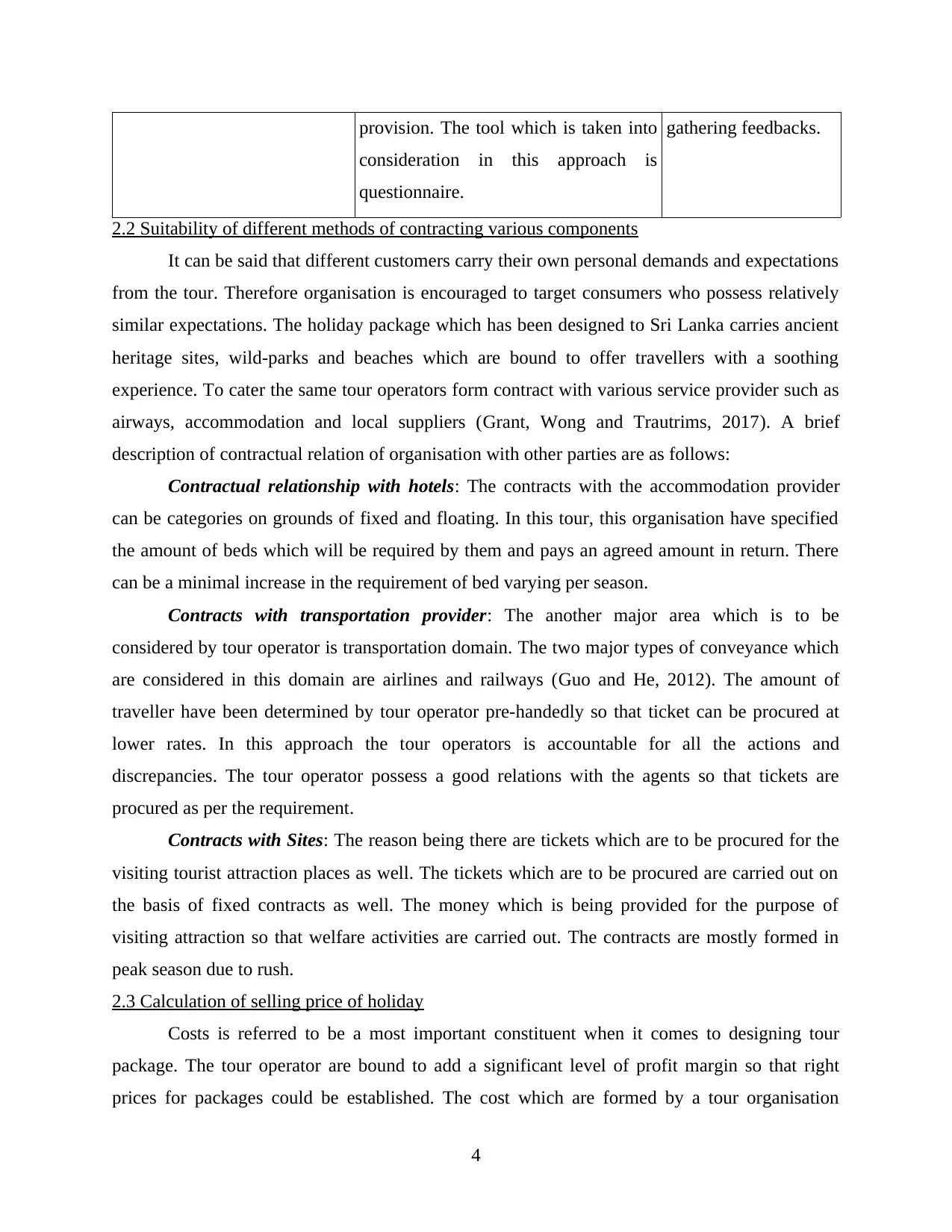
provision. The tool which is taken into
consideration in this approach is
questionnaire.
gathering feedbacks.
2.2 Suitability of different methods of contracting various components
It can be said that different customers carry their own personal demands and expectations
from the tour. Therefore organisation is encouraged to target consumers who possess relatively
similar expectations. The holiday package which has been designed to Sri Lanka carries ancient
heritage sites, wild-parks and beaches which are bound to offer travellers with a soothing
experience. To cater the same tour operators form contract with various service provider such as
airways, accommodation and local suppliers (Grant, Wong and Trautrims, 2017). A brief
description of contractual relation of organisation with other parties are as follows:
Contractual relationship with hotels: The contracts with the accommodation provider
can be categories on grounds of fixed and floating. In this tour, this organisation have specified
the amount of beds which will be required by them and pays an agreed amount in return. There
can be a minimal increase in the requirement of bed varying per season.
Contracts with transportation provider: The another major area which is to be
considered by tour operator is transportation domain. The two major types of conveyance which
are considered in this domain are airlines and railways (Guo and He, 2012). The amount of
traveller have been determined by tour operator pre-handedly so that ticket can be procured at
lower rates. In this approach the tour operators is accountable for all the actions and
discrepancies. The tour operator possess a good relations with the agents so that tickets are
procured as per the requirement.
Contracts with Sites: The reason being there are tickets which are to be procured for the
visiting tourist attraction places as well. The tickets which are to be procured are carried out on
the basis of fixed contracts as well. The money which is being provided for the purpose of
visiting attraction so that welfare activities are carried out. The contracts are mostly formed in
peak season due to rush.
2.3 Calculation of selling price of holiday
Costs is referred to be a most important constituent when it comes to designing tour
package. The tour operator are bound to add a significant level of profit margin so that right
prices for packages could be established. The cost which are formed by a tour organisation
4
consideration in this approach is
questionnaire.
gathering feedbacks.
2.2 Suitability of different methods of contracting various components
It can be said that different customers carry their own personal demands and expectations
from the tour. Therefore organisation is encouraged to target consumers who possess relatively
similar expectations. The holiday package which has been designed to Sri Lanka carries ancient
heritage sites, wild-parks and beaches which are bound to offer travellers with a soothing
experience. To cater the same tour operators form contract with various service provider such as
airways, accommodation and local suppliers (Grant, Wong and Trautrims, 2017). A brief
description of contractual relation of organisation with other parties are as follows:
Contractual relationship with hotels: The contracts with the accommodation provider
can be categories on grounds of fixed and floating. In this tour, this organisation have specified
the amount of beds which will be required by them and pays an agreed amount in return. There
can be a minimal increase in the requirement of bed varying per season.
Contracts with transportation provider: The another major area which is to be
considered by tour operator is transportation domain. The two major types of conveyance which
are considered in this domain are airlines and railways (Guo and He, 2012). The amount of
traveller have been determined by tour operator pre-handedly so that ticket can be procured at
lower rates. In this approach the tour operators is accountable for all the actions and
discrepancies. The tour operator possess a good relations with the agents so that tickets are
procured as per the requirement.
Contracts with Sites: The reason being there are tickets which are to be procured for the
visiting tourist attraction places as well. The tickets which are to be procured are carried out on
the basis of fixed contracts as well. The money which is being provided for the purpose of
visiting attraction so that welfare activities are carried out. The contracts are mostly formed in
peak season due to rush.
2.3 Calculation of selling price of holiday
Costs is referred to be a most important constituent when it comes to designing tour
package. The tour operator are bound to add a significant level of profit margin so that right
prices for packages could be established. The cost which are formed by a tour organisation
4
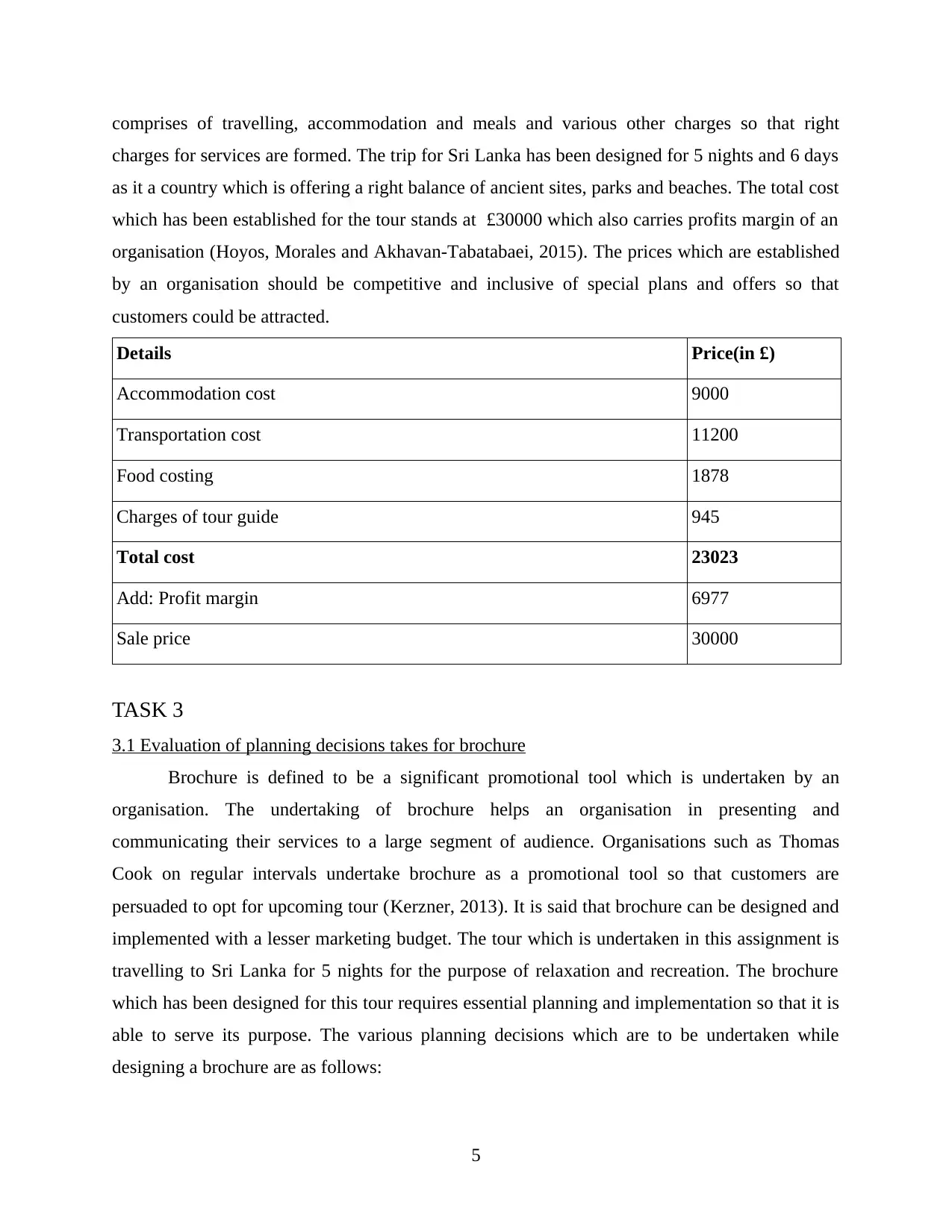
comprises of travelling, accommodation and meals and various other charges so that right
charges for services are formed. The trip for Sri Lanka has been designed for 5 nights and 6 days
as it a country which is offering a right balance of ancient sites, parks and beaches. The total cost
which has been established for the tour stands at £30000 which also carries profits margin of an
organisation (Hoyos, Morales and Akhavan-Tabatabaei, 2015). The prices which are established
by an organisation should be competitive and inclusive of special plans and offers so that
customers could be attracted.
Details Price(in £)
Accommodation cost 9000
Transportation cost 11200
Food costing 1878
Charges of tour guide 945
Total cost 23023
Add: Profit margin 6977
Sale price 30000
TASK 3
3.1 Evaluation of planning decisions takes for brochure
Brochure is defined to be a significant promotional tool which is undertaken by an
organisation. The undertaking of brochure helps an organisation in presenting and
communicating their services to a large segment of audience. Organisations such as Thomas
Cook on regular intervals undertake brochure as a promotional tool so that customers are
persuaded to opt for upcoming tour (Kerzner, 2013). It is said that brochure can be designed and
implemented with a lesser marketing budget. The tour which is undertaken in this assignment is
travelling to Sri Lanka for 5 nights for the purpose of relaxation and recreation. The brochure
which has been designed for this tour requires essential planning and implementation so that it is
able to serve its purpose. The various planning decisions which are to be undertaken while
designing a brochure are as follows:
5
charges for services are formed. The trip for Sri Lanka has been designed for 5 nights and 6 days
as it a country which is offering a right balance of ancient sites, parks and beaches. The total cost
which has been established for the tour stands at £30000 which also carries profits margin of an
organisation (Hoyos, Morales and Akhavan-Tabatabaei, 2015). The prices which are established
by an organisation should be competitive and inclusive of special plans and offers so that
customers could be attracted.
Details Price(in £)
Accommodation cost 9000
Transportation cost 11200
Food costing 1878
Charges of tour guide 945
Total cost 23023
Add: Profit margin 6977
Sale price 30000
TASK 3
3.1 Evaluation of planning decisions takes for brochure
Brochure is defined to be a significant promotional tool which is undertaken by an
organisation. The undertaking of brochure helps an organisation in presenting and
communicating their services to a large segment of audience. Organisations such as Thomas
Cook on regular intervals undertake brochure as a promotional tool so that customers are
persuaded to opt for upcoming tour (Kerzner, 2013). It is said that brochure can be designed and
implemented with a lesser marketing budget. The tour which is undertaken in this assignment is
travelling to Sri Lanka for 5 nights for the purpose of relaxation and recreation. The brochure
which has been designed for this tour requires essential planning and implementation so that it is
able to serve its purpose. The various planning decisions which are to be undertaken while
designing a brochure are as follows:
5
Paraphrase This Document
Need a fresh take? Get an instant paraphrase of this document with our AI Paraphraser
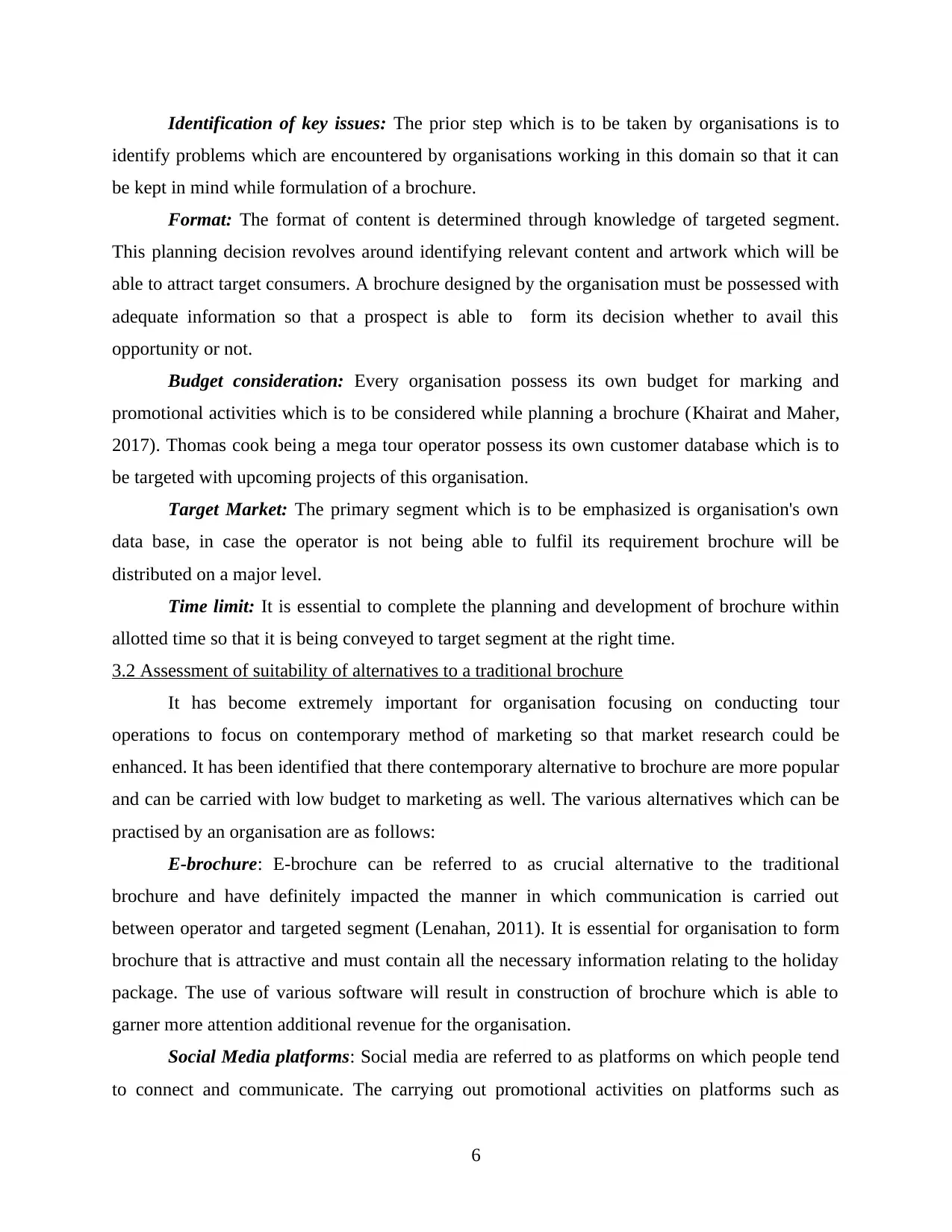
Identification of key issues: The prior step which is to be taken by organisations is to
identify problems which are encountered by organisations working in this domain so that it can
be kept in mind while formulation of a brochure.
Format: The format of content is determined through knowledge of targeted segment.
This planning decision revolves around identifying relevant content and artwork which will be
able to attract target consumers. A brochure designed by the organisation must be possessed with
adequate information so that a prospect is able to form its decision whether to avail this
opportunity or not.
Budget consideration: Every organisation possess its own budget for marking and
promotional activities which is to be considered while planning a brochure (Khairat and Maher,
2017). Thomas cook being a mega tour operator possess its own customer database which is to
be targeted with upcoming projects of this organisation.
Target Market: The primary segment which is to be emphasized is organisation's own
data base, in case the operator is not being able to fulfil its requirement brochure will be
distributed on a major level.
Time limit: It is essential to complete the planning and development of brochure within
allotted time so that it is being conveyed to target segment at the right time.
3.2 Assessment of suitability of alternatives to a traditional brochure
It has become extremely important for organisation focusing on conducting tour
operations to focus on contemporary method of marketing so that market research could be
enhanced. It has been identified that there contemporary alternative to brochure are more popular
and can be carried with low budget to marketing as well. The various alternatives which can be
practised by an organisation are as follows:
E-brochure: E-brochure can be referred to as crucial alternative to the traditional
brochure and have definitely impacted the manner in which communication is carried out
between operator and targeted segment (Lenahan, 2011). It is essential for organisation to form
brochure that is attractive and must contain all the necessary information relating to the holiday
package. The use of various software will result in construction of brochure which is able to
garner more attention additional revenue for the organisation.
Social Media platforms: Social media are referred to as platforms on which people tend
to connect and communicate. The carrying out promotional activities on platforms such as
6
identify problems which are encountered by organisations working in this domain so that it can
be kept in mind while formulation of a brochure.
Format: The format of content is determined through knowledge of targeted segment.
This planning decision revolves around identifying relevant content and artwork which will be
able to attract target consumers. A brochure designed by the organisation must be possessed with
adequate information so that a prospect is able to form its decision whether to avail this
opportunity or not.
Budget consideration: Every organisation possess its own budget for marking and
promotional activities which is to be considered while planning a brochure (Khairat and Maher,
2017). Thomas cook being a mega tour operator possess its own customer database which is to
be targeted with upcoming projects of this organisation.
Target Market: The primary segment which is to be emphasized is organisation's own
data base, in case the operator is not being able to fulfil its requirement brochure will be
distributed on a major level.
Time limit: It is essential to complete the planning and development of brochure within
allotted time so that it is being conveyed to target segment at the right time.
3.2 Assessment of suitability of alternatives to a traditional brochure
It has become extremely important for organisation focusing on conducting tour
operations to focus on contemporary method of marketing so that market research could be
enhanced. It has been identified that there contemporary alternative to brochure are more popular
and can be carried with low budget to marketing as well. The various alternatives which can be
practised by an organisation are as follows:
E-brochure: E-brochure can be referred to as crucial alternative to the traditional
brochure and have definitely impacted the manner in which communication is carried out
between operator and targeted segment (Lenahan, 2011). It is essential for organisation to form
brochure that is attractive and must contain all the necessary information relating to the holiday
package. The use of various software will result in construction of brochure which is able to
garner more attention additional revenue for the organisation.
Social Media platforms: Social media are referred to as platforms on which people tend
to connect and communicate. The carrying out promotional activities on platforms such as
6
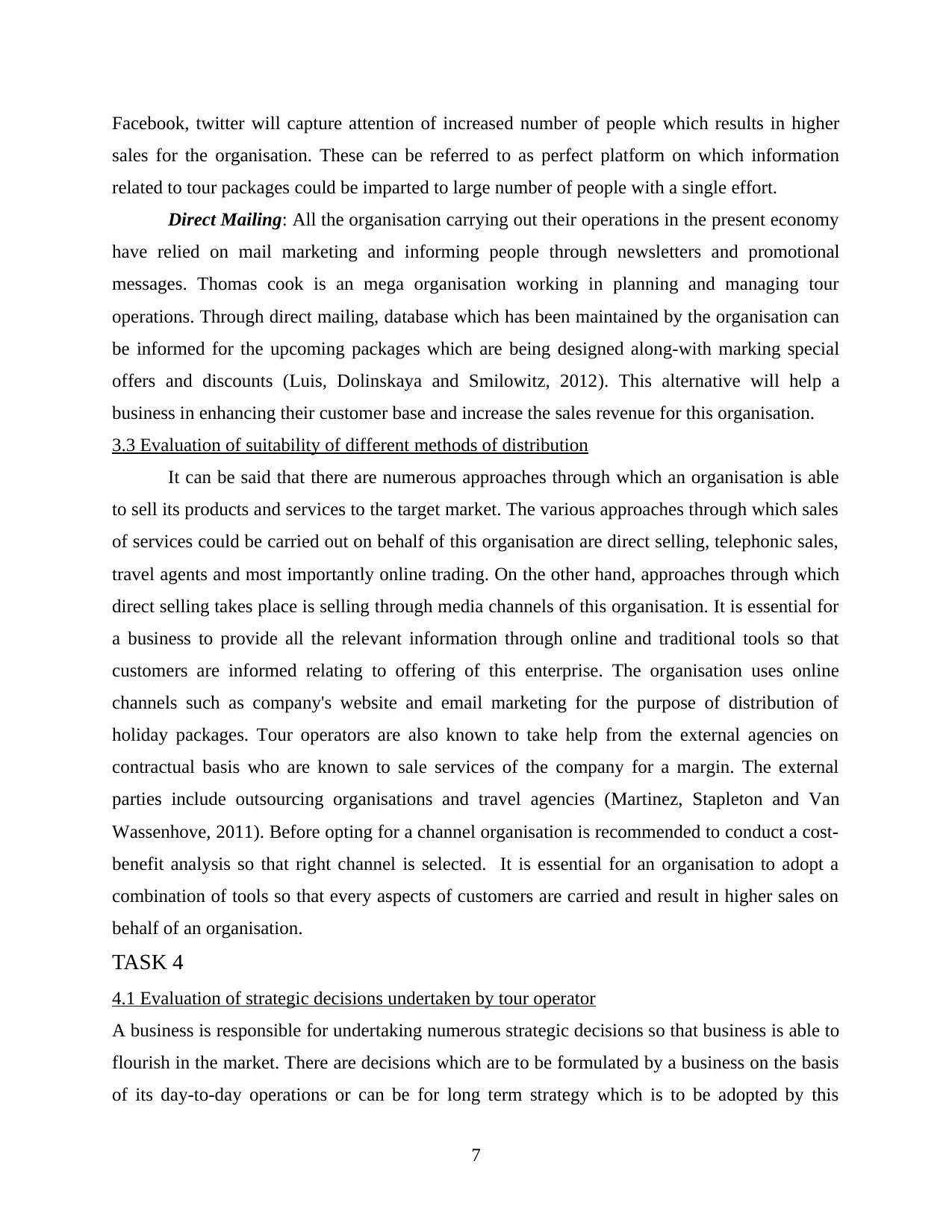
Facebook, twitter will capture attention of increased number of people which results in higher
sales for the organisation. These can be referred to as perfect platform on which information
related to tour packages could be imparted to large number of people with a single effort.
Direct Mailing: All the organisation carrying out their operations in the present economy
have relied on mail marketing and informing people through newsletters and promotional
messages. Thomas cook is an mega organisation working in planning and managing tour
operations. Through direct mailing, database which has been maintained by the organisation can
be informed for the upcoming packages which are being designed along-with marking special
offers and discounts (Luis, Dolinskaya and Smilowitz, 2012). This alternative will help a
business in enhancing their customer base and increase the sales revenue for this organisation.
3.3 Evaluation of suitability of different methods of distribution
It can be said that there are numerous approaches through which an organisation is able
to sell its products and services to the target market. The various approaches through which sales
of services could be carried out on behalf of this organisation are direct selling, telephonic sales,
travel agents and most importantly online trading. On the other hand, approaches through which
direct selling takes place is selling through media channels of this organisation. It is essential for
a business to provide all the relevant information through online and traditional tools so that
customers are informed relating to offering of this enterprise. The organisation uses online
channels such as company's website and email marketing for the purpose of distribution of
holiday packages. Tour operators are also known to take help from the external agencies on
contractual basis who are known to sale services of the company for a margin. The external
parties include outsourcing organisations and travel agencies (Martinez, Stapleton and Van
Wassenhove, 2011). Before opting for a channel organisation is recommended to conduct a cost-
benefit analysis so that right channel is selected. It is essential for an organisation to adopt a
combination of tools so that every aspects of customers are carried and result in higher sales on
behalf of an organisation.
TASK 4
4.1 Evaluation of strategic decisions undertaken by tour operator
A business is responsible for undertaking numerous strategic decisions so that business is able to
flourish in the market. There are decisions which are to be formulated by a business on the basis
of its day-to-day operations or can be for long term strategy which is to be adopted by this
7
sales for the organisation. These can be referred to as perfect platform on which information
related to tour packages could be imparted to large number of people with a single effort.
Direct Mailing: All the organisation carrying out their operations in the present economy
have relied on mail marketing and informing people through newsletters and promotional
messages. Thomas cook is an mega organisation working in planning and managing tour
operations. Through direct mailing, database which has been maintained by the organisation can
be informed for the upcoming packages which are being designed along-with marking special
offers and discounts (Luis, Dolinskaya and Smilowitz, 2012). This alternative will help a
business in enhancing their customer base and increase the sales revenue for this organisation.
3.3 Evaluation of suitability of different methods of distribution
It can be said that there are numerous approaches through which an organisation is able
to sell its products and services to the target market. The various approaches through which sales
of services could be carried out on behalf of this organisation are direct selling, telephonic sales,
travel agents and most importantly online trading. On the other hand, approaches through which
direct selling takes place is selling through media channels of this organisation. It is essential for
a business to provide all the relevant information through online and traditional tools so that
customers are informed relating to offering of this enterprise. The organisation uses online
channels such as company's website and email marketing for the purpose of distribution of
holiday packages. Tour operators are also known to take help from the external agencies on
contractual basis who are known to sale services of the company for a margin. The external
parties include outsourcing organisations and travel agencies (Martinez, Stapleton and Van
Wassenhove, 2011). Before opting for a channel organisation is recommended to conduct a cost-
benefit analysis so that right channel is selected. It is essential for an organisation to adopt a
combination of tools so that every aspects of customers are carried and result in higher sales on
behalf of an organisation.
TASK 4
4.1 Evaluation of strategic decisions undertaken by tour operator
A business is responsible for undertaking numerous strategic decisions so that business is able to
flourish in the market. There are decisions which are to be formulated by a business on the basis
of its day-to-day operations or can be for long term strategy which is to be adopted by this
7
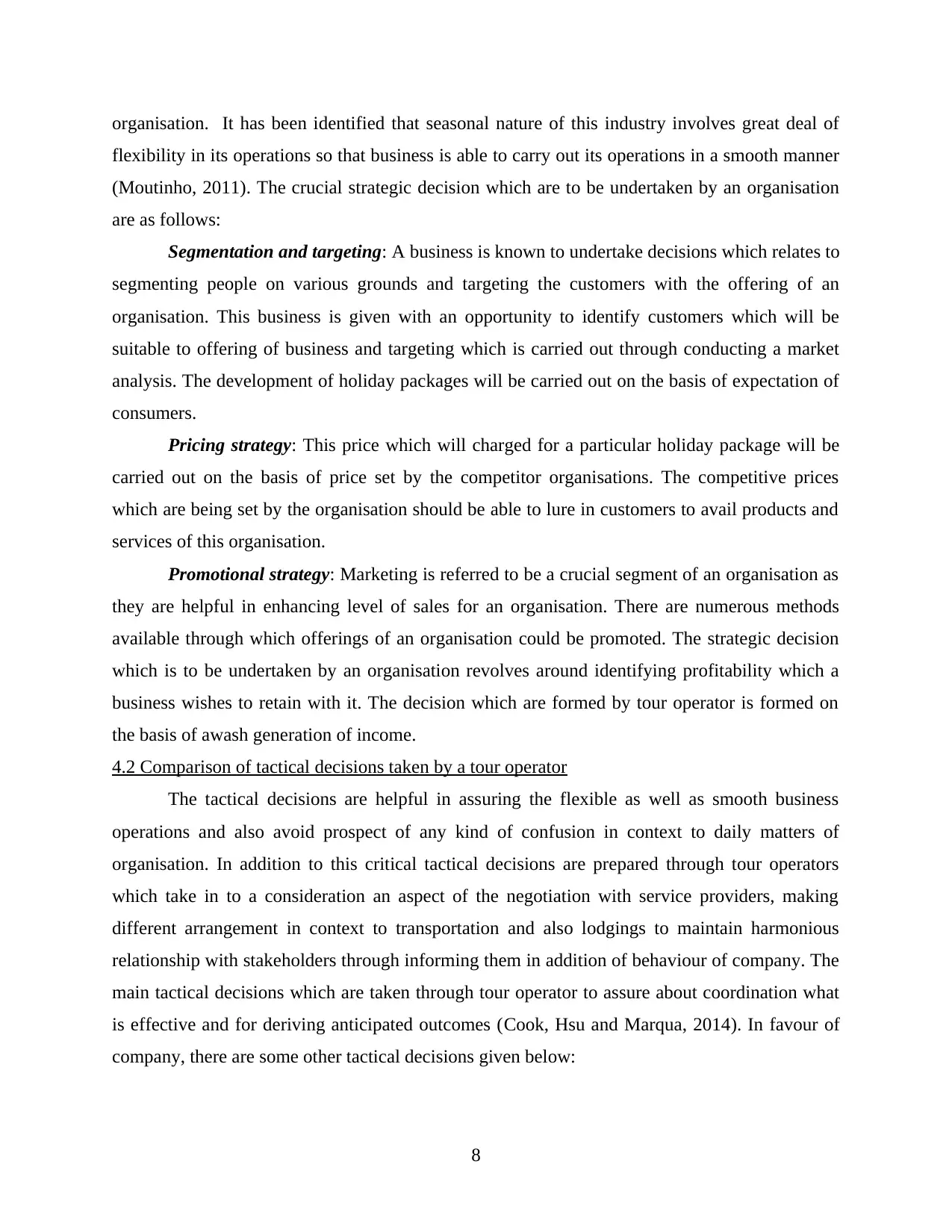
organisation. It has been identified that seasonal nature of this industry involves great deal of
flexibility in its operations so that business is able to carry out its operations in a smooth manner
(Moutinho, 2011). The crucial strategic decision which are to be undertaken by an organisation
are as follows:
Segmentation and targeting: A business is known to undertake decisions which relates to
segmenting people on various grounds and targeting the customers with the offering of an
organisation. This business is given with an opportunity to identify customers which will be
suitable to offering of business and targeting which is carried out through conducting a market
analysis. The development of holiday packages will be carried out on the basis of expectation of
consumers.
Pricing strategy: This price which will charged for a particular holiday package will be
carried out on the basis of price set by the competitor organisations. The competitive prices
which are being set by the organisation should be able to lure in customers to avail products and
services of this organisation.
Promotional strategy: Marketing is referred to be a crucial segment of an organisation as
they are helpful in enhancing level of sales for an organisation. There are numerous methods
available through which offerings of an organisation could be promoted. The strategic decision
which is to be undertaken by an organisation revolves around identifying profitability which a
business wishes to retain with it. The decision which are formed by tour operator is formed on
the basis of awash generation of income.
4.2 Comparison of tactical decisions taken by a tour operator
The tactical decisions are helpful in assuring the flexible as well as smooth business
operations and also avoid prospect of any kind of confusion in context to daily matters of
organisation. In addition to this critical tactical decisions are prepared through tour operators
which take in to a consideration an aspect of the negotiation with service providers, making
different arrangement in context to transportation and also lodgings to maintain harmonious
relationship with stakeholders through informing them in addition of behaviour of company. The
main tactical decisions which are taken through tour operator to assure about coordination what
is effective and for deriving anticipated outcomes (Cook, Hsu and Marqua, 2014). In favour of
company, there are some other tactical decisions given below:
8
flexibility in its operations so that business is able to carry out its operations in a smooth manner
(Moutinho, 2011). The crucial strategic decision which are to be undertaken by an organisation
are as follows:
Segmentation and targeting: A business is known to undertake decisions which relates to
segmenting people on various grounds and targeting the customers with the offering of an
organisation. This business is given with an opportunity to identify customers which will be
suitable to offering of business and targeting which is carried out through conducting a market
analysis. The development of holiday packages will be carried out on the basis of expectation of
consumers.
Pricing strategy: This price which will charged for a particular holiday package will be
carried out on the basis of price set by the competitor organisations. The competitive prices
which are being set by the organisation should be able to lure in customers to avail products and
services of this organisation.
Promotional strategy: Marketing is referred to be a crucial segment of an organisation as
they are helpful in enhancing level of sales for an organisation. There are numerous methods
available through which offerings of an organisation could be promoted. The strategic decision
which is to be undertaken by an organisation revolves around identifying profitability which a
business wishes to retain with it. The decision which are formed by tour operator is formed on
the basis of awash generation of income.
4.2 Comparison of tactical decisions taken by a tour operator
The tactical decisions are helpful in assuring the flexible as well as smooth business
operations and also avoid prospect of any kind of confusion in context to daily matters of
organisation. In addition to this critical tactical decisions are prepared through tour operators
which take in to a consideration an aspect of the negotiation with service providers, making
different arrangement in context to transportation and also lodgings to maintain harmonious
relationship with stakeholders through informing them in addition of behaviour of company. The
main tactical decisions which are taken through tour operator to assure about coordination what
is effective and for deriving anticipated outcomes (Cook, Hsu and Marqua, 2014). In favour of
company, there are some other tactical decisions given below:
8
Secure Best Marks with AI Grader
Need help grading? Try our AI Grader for instant feedback on your assignments.
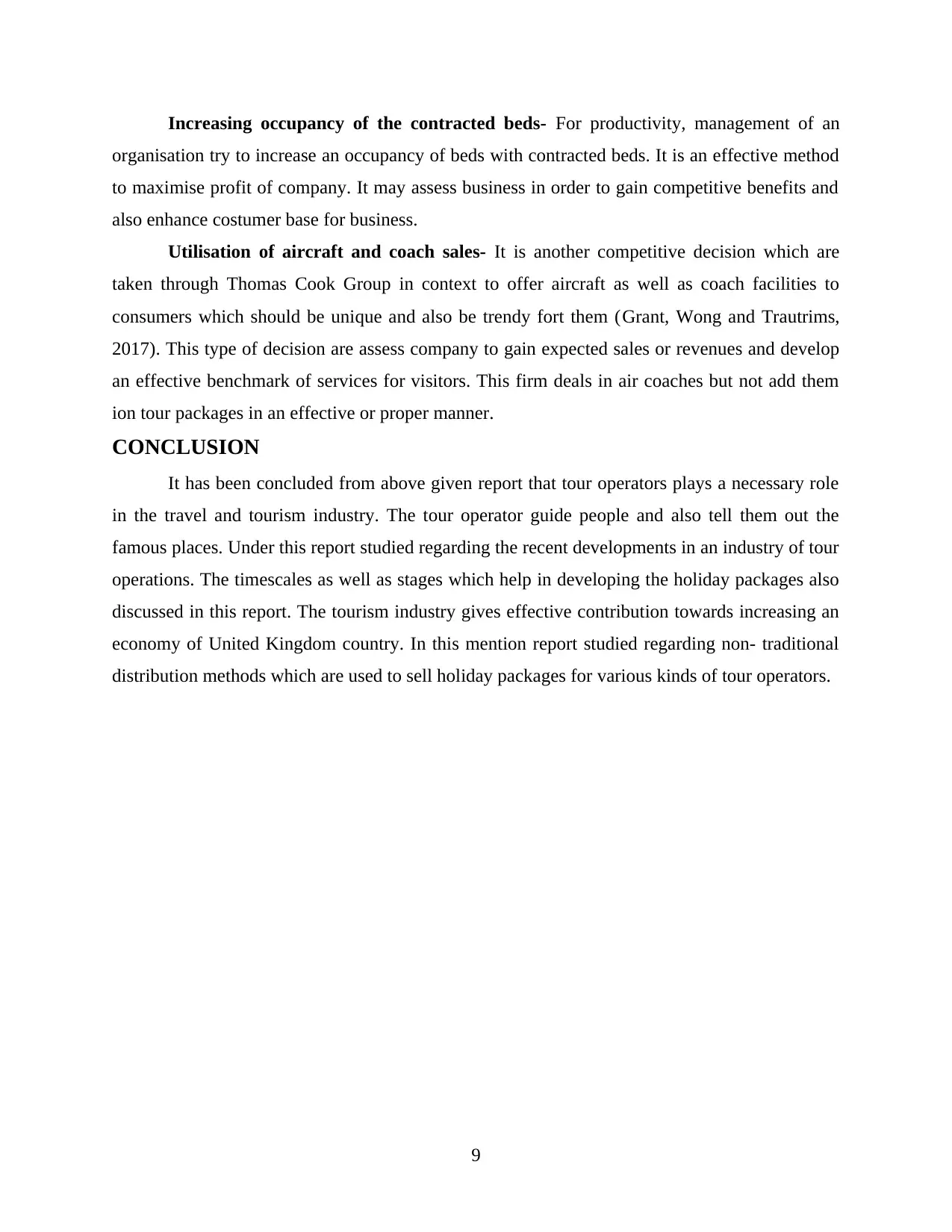
Increasing occupancy of the contracted beds- For productivity, management of an
organisation try to increase an occupancy of beds with contracted beds. It is an effective method
to maximise profit of company. It may assess business in order to gain competitive benefits and
also enhance costumer base for business.
Utilisation of aircraft and coach sales- It is another competitive decision which are
taken through Thomas Cook Group in context to offer aircraft as well as coach facilities to
consumers which should be unique and also be trendy fort them (Grant, Wong and Trautrims,
2017). This type of decision are assess company to gain expected sales or revenues and develop
an effective benchmark of services for visitors. This firm deals in air coaches but not add them
ion tour packages in an effective or proper manner.
CONCLUSION
It has been concluded from above given report that tour operators plays a necessary role
in the travel and tourism industry. The tour operator guide people and also tell them out the
famous places. Under this report studied regarding the recent developments in an industry of tour
operations. The timescales as well as stages which help in developing the holiday packages also
discussed in this report. The tourism industry gives effective contribution towards increasing an
economy of United Kingdom country. In this mention report studied regarding non- traditional
distribution methods which are used to sell holiday packages for various kinds of tour operators.
9
organisation try to increase an occupancy of beds with contracted beds. It is an effective method
to maximise profit of company. It may assess business in order to gain competitive benefits and
also enhance costumer base for business.
Utilisation of aircraft and coach sales- It is another competitive decision which are
taken through Thomas Cook Group in context to offer aircraft as well as coach facilities to
consumers which should be unique and also be trendy fort them (Grant, Wong and Trautrims,
2017). This type of decision are assess company to gain expected sales or revenues and develop
an effective benchmark of services for visitors. This firm deals in air coaches but not add them
ion tour packages in an effective or proper manner.
CONCLUSION
It has been concluded from above given report that tour operators plays a necessary role
in the travel and tourism industry. The tour operator guide people and also tell them out the
famous places. Under this report studied regarding the recent developments in an industry of tour
operations. The timescales as well as stages which help in developing the holiday packages also
discussed in this report. The tourism industry gives effective contribution towards increasing an
economy of United Kingdom country. In this mention report studied regarding non- traditional
distribution methods which are used to sell holiday packages for various kinds of tour operators.
9
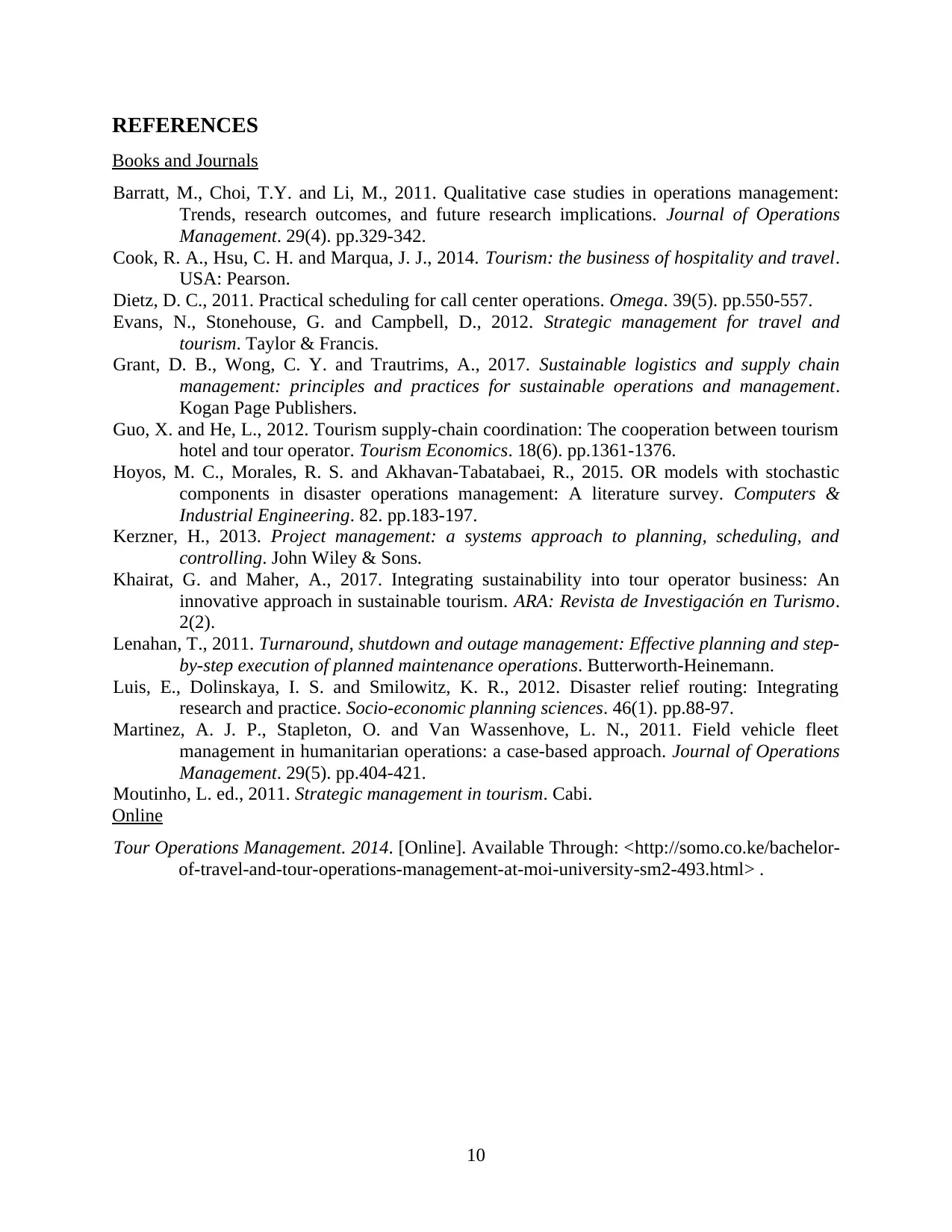
REFERENCES
Books and Journals
Barratt, M., Choi, T.Y. and Li, M., 2011. Qualitative case studies in operations management:
Trends, research outcomes, and future research implications. Journal of Operations
Management. 29(4). pp.329-342.
Cook, R. A., Hsu, C. H. and Marqua, J. J., 2014. Tourism: the business of hospitality and travel.
USA: Pearson.
Dietz, D. C., 2011. Practical scheduling for call center operations. Omega. 39(5). pp.550-557.
Evans, N., Stonehouse, G. and Campbell, D., 2012. Strategic management for travel and
tourism. Taylor & Francis.
Grant, D. B., Wong, C. Y. and Trautrims, A., 2017. Sustainable logistics and supply chain
management: principles and practices for sustainable operations and management.
Kogan Page Publishers.
Guo, X. and He, L., 2012. Tourism supply-chain coordination: The cooperation between tourism
hotel and tour operator. Tourism Economics. 18(6). pp.1361-1376.
Hoyos, M. C., Morales, R. S. and Akhavan-Tabatabaei, R., 2015. OR models with stochastic
components in disaster operations management: A literature survey. Computers &
Industrial Engineering. 82. pp.183-197.
Kerzner, H., 2013. Project management: a systems approach to planning, scheduling, and
controlling. John Wiley & Sons.
Khairat, G. and Maher, A., 2017. Integrating sustainability into tour operator business: An
innovative approach in sustainable tourism. ARA: Revista de Investigación en Turismo.
2(2).
Lenahan, T., 2011. Turnaround, shutdown and outage management: Effective planning and step-
by-step execution of planned maintenance operations. Butterworth-Heinemann.
Luis, E., Dolinskaya, I. S. and Smilowitz, K. R., 2012. Disaster relief routing: Integrating
research and practice. Socio-economic planning sciences. 46(1). pp.88-97.
Martinez, A. J. P., Stapleton, O. and Van Wassenhove, L. N., 2011. Field vehicle fleet
management in humanitarian operations: a case-based approach. Journal of Operations
Management. 29(5). pp.404-421.
Moutinho, L. ed., 2011. Strategic management in tourism. Cabi.
Online
Tour Operations Management. 2014. [Online]. Available Through: <http://somo.co.ke/bachelor-
of-travel-and-tour-operations-management-at-moi-university-sm2-493.html> .
10
Books and Journals
Barratt, M., Choi, T.Y. and Li, M., 2011. Qualitative case studies in operations management:
Trends, research outcomes, and future research implications. Journal of Operations
Management. 29(4). pp.329-342.
Cook, R. A., Hsu, C. H. and Marqua, J. J., 2014. Tourism: the business of hospitality and travel.
USA: Pearson.
Dietz, D. C., 2011. Practical scheduling for call center operations. Omega. 39(5). pp.550-557.
Evans, N., Stonehouse, G. and Campbell, D., 2012. Strategic management for travel and
tourism. Taylor & Francis.
Grant, D. B., Wong, C. Y. and Trautrims, A., 2017. Sustainable logistics and supply chain
management: principles and practices for sustainable operations and management.
Kogan Page Publishers.
Guo, X. and He, L., 2012. Tourism supply-chain coordination: The cooperation between tourism
hotel and tour operator. Tourism Economics. 18(6). pp.1361-1376.
Hoyos, M. C., Morales, R. S. and Akhavan-Tabatabaei, R., 2015. OR models with stochastic
components in disaster operations management: A literature survey. Computers &
Industrial Engineering. 82. pp.183-197.
Kerzner, H., 2013. Project management: a systems approach to planning, scheduling, and
controlling. John Wiley & Sons.
Khairat, G. and Maher, A., 2017. Integrating sustainability into tour operator business: An
innovative approach in sustainable tourism. ARA: Revista de Investigación en Turismo.
2(2).
Lenahan, T., 2011. Turnaround, shutdown and outage management: Effective planning and step-
by-step execution of planned maintenance operations. Butterworth-Heinemann.
Luis, E., Dolinskaya, I. S. and Smilowitz, K. R., 2012. Disaster relief routing: Integrating
research and practice. Socio-economic planning sciences. 46(1). pp.88-97.
Martinez, A. J. P., Stapleton, O. and Van Wassenhove, L. N., 2011. Field vehicle fleet
management in humanitarian operations: a case-based approach. Journal of Operations
Management. 29(5). pp.404-421.
Moutinho, L. ed., 2011. Strategic management in tourism. Cabi.
Online
Tour Operations Management. 2014. [Online]. Available Through: <http://somo.co.ke/bachelor-
of-travel-and-tour-operations-management-at-moi-university-sm2-493.html> .
10
1 out of 12
Related Documents
Your All-in-One AI-Powered Toolkit for Academic Success.
+13062052269
info@desklib.com
Available 24*7 on WhatsApp / Email
![[object Object]](/_next/static/media/star-bottom.7253800d.svg)
Unlock your academic potential
© 2024 | Zucol Services PVT LTD | All rights reserved.





